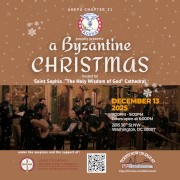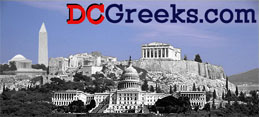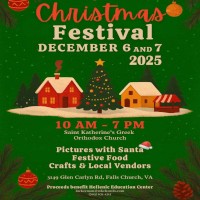|
|
|||||||||||||||||
|
DCGreeks.com Goes Back to School Picture this…you're 18 years old and you've left home for the first time to go off to college. You've left behind your families and your high school friends who you swore you'd always keep in touch with and enter a realm where you find yourself starting from scratch. Most high-schoolers go through this, but if you're like most Greeks in this area, going off to college means not only leaving behind your family and high school friends, but your parea as well. Some of these people you've known since Greek School; you grew up with them, saw them all the time at GOYA events and at church. Now you find yourself having to say goodbye to your friends and this comfortable environment for nine months out of the year. It sounds like a punishment fit for Persephone if she had taken a couple more bites out of that pomegranate of hers, but unlike her situation, leaving home doesn't necessarily mean having to go to a Greek cultural underworld. College Hellenic Societies have different histories depending on which school you go to, but they've basically been founded on the same premise and for the same goals-- to provide a place where Greeks from here and abroad who attend college can come together, share their Greek culture and heritage both with themselves and with others in the university community, and just have a good time. Sounds like a simple enough idea, but the variations of this concept can vary from college to college, even in the local area. The Guys @ DCGreeks.com attended our first meeting of the George Washington University's Kosmos Hellenic Club last week. We'd been attending some of their social events for the last year or so; we'd never actually shown up for a formal meeting, but when we saw that they were having an open house of sorts at their first meeting of the semester, we decided it'd be a good a time as any to show up. The Kosmos Club is one of the more interesting Hellenic Student Associations we've encountered, as it's classification as a George Washington University student organization in no way limits the reach of its membership. Just going around the room we were all introduced to students at GW, both undergrads and grad students, as well as students from other local schools. (It seems some schools in this area either don't have the Greek population or the infrastructure in place to support a Hellenic Club of their own, so some people have decided to attend GW's meetings instead.) Kosmos has a nice mix of social and cultural events, and being in DC, a number of political events (mostly centered around Greek, Turkish, and Cypriot relations) thrown in for good measure. Its membership is pretty diverse as Greeks go; you've got your local Greek-Americans, your mid-Atlantic and NY/NJ Greeks-- even some Greeks representing the West Coast. Throw in a few FOBs, (Fresh Off the Boat, a term that they use to affectionately refer to their members who are from Greece or Cyprus that have come to the States to study) and you basically have a group that involves itself with a lot of different aspects of Greek culture. The Kosmos Club is really big into the teaching and performance of traditional Greek Dance and even offers lessons to non-students too. From what we've seen so far the Kosmos Club at GW seems to have its act together, but we wanted to take a few paragraphs to talk about another Hellenic Society that's more near and dear to our hearts where the same was true back in the day, the Hellenic Society at the University of Virginia. When we were first-years in the fall of 1993, the Hellenic Society was at the beginning of it's Golden Age. We had 55 members in the society, ranging in age from first-years to grad-students, coming from all different parts of Virginia, (NoVA, Richmond, Southwest Virginia, and Tidewater), other states (New Jersey, Maryland, and others) as well as from Greece and Cyprus. During our undergrad years there we put on annual Greek dancing performances for the University's Culturefest, we'd meet up a couple times a month at the local Greek owner diner for glenti and gyros, we'd organize Greek semi-formal dances to get all the Greek college kids in the area together, and we'd generally have a lot of fun doing it. We met a lot of good Greeks during our time at U.Va. and some of them we still hang out with and keep in touch with to this day.But something happened to the Hellenic Society at U.Va. right between the time we graduated from undergrad and the time that Aris finished law school in 2000. Suddenly the group of 55 wasn't 55 anymore. Some months they'd be lucky to get 10 people at a meeting. As people graduated, the demographics and the focus of the Hellenic Society had changed, and new people stopped showing up as a result. People always say that college is a microcosm, and even in Hellenic Societies this is true. What caused the decline in the activity of the Hellenic Society at U.Va. can be attributed to two things-- culture and cliques. Most college Hellenic student clubs are made of Greeks with many diverse backgrounds. Some come from areas like the Washington, DC metro area, where they've got an active church community and are very in touch with their Greek heritage. Most of these people have parents who were born in Greece, know how to speak the language, and are very involved in the Greek scene. There are other Greeks, however, who aren't as fortunate as some to live in such a hotbed of Greek culture that you find in major cities like Washington, DC. Some of them are second or third generation Greek-Americans who might not even speak the language and find the kalamatiano to be as hard to follow as any other 12-step program. They show up to college eager to finally get a chance to meet some Greeks their age, but what they sometimes find are people who aren't as eager to meet them because they aren't Greek enough. We went through a stage like this at U.Va. where if you didn't Greek dance or speak the language, you were made to feel as an outsider. None of this treatment necessarily happened on purpose, but rather it was a natural byproduct of the society's focus at the time. People seemed to forget that the Hellenic Society's first priority is to its members; its existence is not based solely to have a Greek Dance troupe ready to perform for others in the University community. There'd be years at U.Va. where almost our entire budget went to buy foustanelles, leaving us with little cash to try to organize other events and forcing us to peddle baklava and other baked goods on the Lawn between classes just to break even. The other thing we saw that turned off people to the Hellenic Society was the cliques that cropped up during our time there. Greek populations at colleges are pretty small, especially the farther away you get from a major city. Having a pool as small as 50-60 people should seem to make for a good parea, but some wanted to ultimately break it up even more. At U.Va. we had the Dance Clique, the Norfolk GOYA Clique, the NoVa Clique, and the FOB Clique, each seemingly with it's own thought on the direction that the Hellenic Society should go. Whichever one of these cliques had members on the Society's board basically dictated what we'd do, and everyone else would get disillusioned as a result. There are some Hellenic Student Associations that were active back in the day, but from all signs, have waned in recent years. Spend a few minutes on the internet, and you can see how evident this is. Ever gone to George Mason University's Hellenic Student Association's web site? It seems it hasn't been updated in four years. We understand that University of Maryland, a place with a pretty big Greek population, doesn't have an undergraduate Hellenic Student Association, but they've got one in place for grad students. We wonder if there's anything in the works to create something for the undergraduate population there?We are happy to see that U.Va.'s Hellenic Society has made a resurgence in the past couple of years thanks to a new crop of members and leadership that has learned from the mistakes of their predecessors. There are other local Hellenic societies, such as the one at James Madison University, that are getting more active and drawing more members too. Hopefully we can see this trend continue and spread to other local colleges and universities in the area as well.
|




